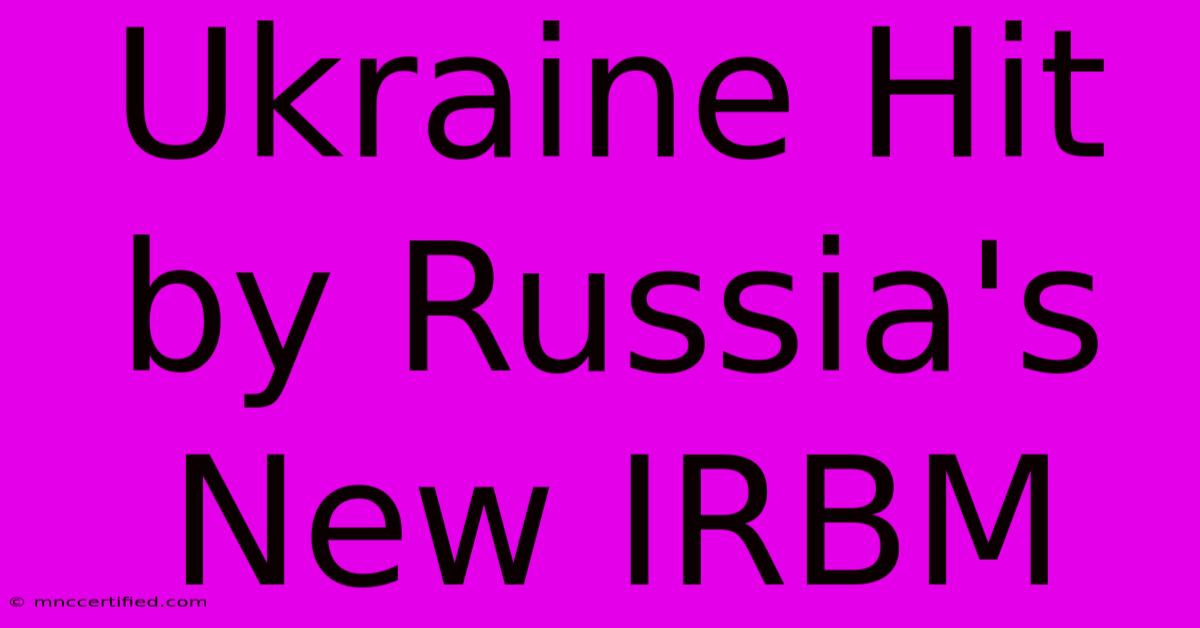Ukraine Hit By Russia's New IRBM

Table of Contents
Ukraine Hit by Russia's New IRBM: Escalation of the Conflict?
The ongoing conflict in Ukraine took a potentially significant turn with reports of Russia deploying a new intermediate-range ballistic missile (IRBM). This development raises serious concerns about the escalation of the war and the implications for regional and global security. Understanding the characteristics of this weapon and its potential impact is crucial for analyzing the evolving situation.
What is an IRBM and Why is its Use Significant?
An Intermediate-range ballistic missile (IRBM) is a ballistic missile with a range exceeding 1,000 kilometers but less than 5,500 kilometers. Unlike shorter-range missiles, IRBMs can strike targets much farther away, significantly expanding the potential battlefield. Russia's deployment of this new IRBM in the Ukraine conflict represents a potential escalation, as it demonstrates a willingness to use more powerful and longer-range weaponry. This move could also be interpreted as a show of force and a signal to Ukraine and its allies. The specific model of the IRBM used remains unconfirmed, pending further investigation and official statements.
Potential Implications of the IRBM Deployment
The use of an IRBM in the Ukraine conflict carries several weighty implications:
- Increased Range of Attacks: The extended range allows Russia to strike targets deeper within Ukrainian territory, potentially targeting infrastructure or military installations previously outside the reach of its existing weaponry.
- Escalation of the Conflict: The deployment of a more powerful weapon system could lead to further escalation, potentially prompting a response from Ukraine and its allies. This increased tension raises concerns about the possibility of wider conflict.
- Geopolitical Ramifications: The use of an IRBM has significant geopolitical implications, impacting relations between Russia and the West. It could trigger new sanctions or other retaliatory measures.
- Humanitarian Concerns: The potential for increased damage and casualties resulting from the use of a more powerful missile system raises significant humanitarian concerns. Civilian infrastructure could be at greater risk.
Analyzing the Strategic Goals Behind Russia's Actions
Russia's strategic motivations behind deploying this new IRBM remain a subject of ongoing analysis. Several potential goals can be considered:
- Military Advantage: The IRBM provides Russia with a significant military advantage, expanding its strike capabilities and potentially altering the balance of power on the battlefield.
- Deterrence: The deployment could serve as a deterrent, aiming to discourage Ukrainian counteroffensives or Western military support.
- Political Signaling: The action might be intended as a political signal, demonstrating Russia's resolve and willingness to escalate the conflict to achieve its objectives.
International Response and Future Outlook
The international community has strongly condemned Russia's actions. The deployment of the IRBM will likely lead to increased international pressure on Russia. The situation necessitates a careful and measured response to prevent further escalation while supporting Ukraine. The future outlook remains uncertain, highlighting the need for continued diplomatic efforts and close monitoring of the situation.
Keywords:
Ukraine, Russia, IRBM, Intermediate-Range Ballistic Missile, Conflict Escalation, Military Strategy, Geopolitics, International Relations, War in Ukraine, Russia-Ukraine War, Missile Deployment, Security Concerns, Humanitarian Crisis.
Note: This article provides information based on available reports. The situation is dynamic, and further developments may alter the analysis. Always consult reliable news sources for the most up-to-date information. This article avoids linking to specific news sources to maintain objectivity and avoid any potential bias.

Thank you for visiting our website wich cover about Ukraine Hit By Russia's New IRBM. We hope the information provided has been useful to you. Feel free to contact us if you have any questions or need further assistance. See you next time and dont miss to bookmark.
Featured Posts
-
Baron Investment Conference 2023
Nov 22, 2024
-
Rev Richard Coles His Music Career
Nov 22, 2024
-
Snowflake Q3 Earnings Revenue Surpasses Expectations
Nov 22, 2024
-
Pete Wicks Reacts To Maura Higgins Split
Nov 22, 2024
-
Ken Reids Funeral Details Confirmed
Nov 22, 2024